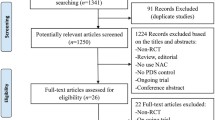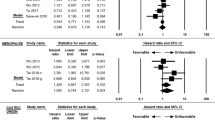Abstract
Background
Krukenberg tumor (KT) is a rare secondary ovarian tumor, primarily localized at the gastrointestinal tract in most cases. KT is related to severe prognosis due to its aggressiveness, diagnostic difficulties and poor treatment efficacy. Several treatments have been used, such as cytoreductive surgery (CRS), adjuvant chemotherapy (CT) and/or hyperthermic intraperitoneal chemotherapy (HIPEC). To date, it is still unclear which treatment or combination of treatments is related to better survival.
Objective
To assess the most effective therapeutic protocol in terms of overall survival (OS).
Methods
A systematic review of the literature was performed by searching MEDLINE, Scopus, EMBASE, ClinicalTrial.gov, OVID, Web of Sciences, Cochrane Library, and Google Scholar for all studies assessing the association of treatments with OS in KTs. The effectiveness of each treatment protocol was evaluated by comparing the OS between patients treated with different treatment protocols.
Results
Twenty retrospective studies, with a total sample size of 1533 KTs, were included in the systematic review. Therapeutic protocols used were CRS in 18 studies, CT in 13 studies, HIPEC in 7 studies, neoadjuvant CT in 2 studies, and some combinations of these in 6 studies. Seven studies showed that CRS significantly improved OS compared to other treatments or association of treatments without it. 11 studies showed that CRS without residual (R0 CRS) had a significantly better OS than CRS with residual (R + CRS). Five studies showed that CT significantly improved OS, but other five showed it did not. Two studies showed that HIPEC in association with CRS improved OS, while another study showed that efficacy of HIPEC was comparable to CT. Two studies evaluated neoadjuvant CT, but results were conflicting.
Conclusion
CRS and in particular R0 CRS are the treatments showing the clearest results in improving OS in KT patients. Results about CT are conflicting. HIPEC appears effective both alone and in combination with CRS, and also related to fewer adverse effect than CT. The usefulness of neoadjuvant CT is still unclear. The association of R0 CRS with HIPEC seems to be the most effective and safe therapeutic protocol for KT patients.


Similar content being viewed by others
References
Al-Agha OM, Nicastri AD (2006) An in-depth look at Krukenberg tumor: an overview. Arch Pathol Lab Med 130(11):1725–1730
Kubeček O, Laco J, Špaček J et al (2017) The pathogenesis, diagnosis, and management metastatic tumors to the ovary: a comprehensive review. Clin Exp Metastasis 34(5):295–307
Novak E, Gray LA (1938) Krukenberg tumors of the ovary: clinical and pathological study of 21 cases. Surg Gynecol Obstet 66:157–167
Wu F, Zhao X, Mi B et al (2015) Clinical characteristics and prognostic analysis of Krukenberg tumor. Mol Clin Oncol 3(6):1323–1328
Seow-En I, Hwarng G, Tan GHC, Ho LML, Teo MCC (2018) Palliative surgery for Krukenberg tumors—12-year experience and review of the literature. World J Clin Oncol 9(1):13–19
Yu P, Huang L, Cheng G et al (2017) Treatment strategy and prognostic factors for Krukenberg tumors of gastric origin: report of a 10-year single-center experience from China. Oncotarget 8(47):82558–82570
Kammar PS, Engineer R, Patil PS, Ostwal V, Shylasree TS, Saklani AP (2017) Ovarian metastases of colorectal origin: treatment patterns and factors affecting outcomes. Indian J Surg Oncol 8(4):519–526
Moher D, Shamseer L, Clarke M et al (2015) Preferred reporting items for systematic review and meta-analysis protocols (PRISMA-P) 2015 statement. Syst Rev 4:1
Slim K, Nini E, Forestier D et al (2003) Methodological index for non-randomized studies (minors): development and validation of a new instrument. ANZ J Surg 73(9):712–716
Xu KY, Gao H, Lian ZJ, Ding L, Li M, Gu J (2017) Clinical analysis of Krukenberg tumours in patients with colorectal cancer—a review of 57 cases. World J Surg Oncol 15(1):25
McCormick CC, Giuntoli RL 2nd, Gardner GJ et al (2007) The role of cytoreductive surgery for colon cancer metastatic to the ovary. Gynecol Oncol 105(3):791–795
Cheong JH, Hyung WJ, Chen J, Kim J, Choi SH, Noh SH (2004) Surgical management and outcome of metachronous Krukenberg tumors from gastric cancer. J Surg Oncol 87(1):39–45
Ganesh K, Shah RH, Vakiani E et al (2017) Clinical and genetic determinants of ovarian metastases from colorectal cancer. Cancer 123(7):1134–1143
Rosa F, Marrelli D, Morgagni P et al (2016) Krukenberg tumors of gastric origin: the rationale of surgical resection and perioperativetreatments in a multicenter western experience. World J Surg 40(4):921–928
Cho JH, Lim JY, Choi AR et al (2015) Comparison of surgery plus chemotherapy and palliative chemotherapy alone for advanced gastric cancer with krukenberg tumor. Cancer Res Treat 47(4):697–705
Wu XJ, Yuan P, Li ZY et al (2013) Cytoreductive surgery and hypertermic intraperitoneal chemotherapy improves the survival of gastric cancer patients with ovarian metastasis and peritoneal dissemination. Tumour Biol 34(1):463–469
Lu LC, Shao YY, Hsu CH et al (2012) Metastasectomy of Krukenberg tumors may be associated with survival benefits in patients with metastatic gastric cancer. Anticancer Res 32(8):3397–3401
Jun SY, Park JK (2011) Metachronous ovarian metastases following resection of the primary gastric cancer. J Gastric Cancer. 11(1):31–37
Kim WY, Kim TJ, Kim SE et al (2010) The role of cytoreductive surgery for non-genital tract metastatic tumors to the ovaries. Eur J Obstet Gynecol Reprod Biol 149(1):97–101
Jiang R, Tang J, Cheng X, Zang RY (2009) Surgical treatment for patients with different origins of Krukenberg tumors: outcomes and prognostic factors. Eur J Surg Oncol. 35(1):92–97
Ayhan A, Guvenal T, Salman MC, Ozyuncu O, Sakinci M, Basaran M (2005) The role of cytoreductive surgery in nongenital cancers metastatic to the ovaries. Gynecol Oncol 98(2):235–241
Cheong JH, Hyung WJ, Chen J, Kim J, Choi SH, Noh SH (2004) Survival benefit of metastasectomy for Krukenberg tumors from gastric cancer. Gynecol Oncol 94(2):477–482
Rayson D, Bouttell E, Whiston F, Stitt L (2000) Outcome after ovarian/adnexal metastectomy in metastatic colorectal carcinoma. J Surg Oncol 75(3):186–192
Kim HK, Heo DS, Bang YJ, Kim NK (2001) Prognostic factors of Krukenberg's tumor. Gynecol Oncol 82(1):105–109
Guzel AB, Kucukgoz G, Paydas S et al (2012) Preoperative evaluation, clinical characteristics and prognostic factors of nongenital metastatic ovarian tumors: review of 48 patients. Eur J Gynaec Oncol 33(5):493–497
Funding
No financial support was received for this study.
Author information
Authors and Affiliations
Contributions
RL: study conception, electronic search, eligibility of the studies, inclusion criteria, risk of bias, data extraction and data analysis. MDL: electronic search, eligibility of the studies, inclusion criteria, risk of bias, data extraction and data analysis, and manuscript preparation. AT, AR: study conception, disagreement resolution, and manuscript preparation. GS: electronic search, eligibility of the studies, inclusion criteria, risk of bias, data extraction and data analysis. MM: methods supervision and manuscript preparation. LI: study design, methods supervision, and manuscript preparation. MDA: study design, manuscript preparation, and whole study supervision. FZ: study design, methods supervision, and whole study supervision. FC: study conception and whole study supervision.
Corresponding author
Ethics declarations
Conflict of interest
The authors report no conflict of interest.
Additional information
Publisher's Note
Springer Nature remains neutral with regard to jurisdictional claims in published maps and institutional affiliations.
Rights and permissions
About this article
Cite this article
Lionetti, R., De Luca, M., Travaglino, A. et al. Treatments and overall survival in patients with Krukenberg tumor. Arch Gynecol Obstet 300, 15–23 (2019). https://doi.org/10.1007/s00404-019-05167-z
Received:
Accepted:
Published:
Issue Date:
DOI: https://doi.org/10.1007/s00404-019-05167-z




